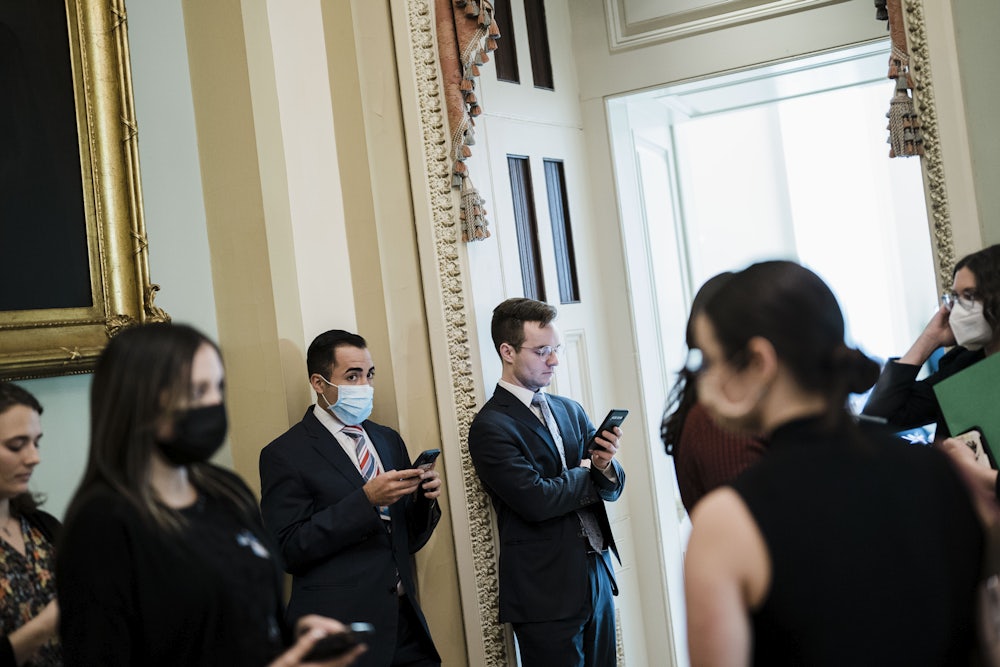Editor’s Note: This piece was written by two Democratic congressional staffers on behalf of a 12-member organizing committee. Since they face possible retaliation until the House vote takes place, The New Republic has agreed to keep their identities private.
The Democratic Party platform states: “Democrats will make it easier for workers, public and private, to exercise their right to organize and join unions.” One hundred days after House Speaker Nancy Pelosi promised to support staff unionization—as the groundswell of labor organizing across the country reached the halls of Congress—the credibility of lawmakers is being put to the test.
Will our bosses lead by example by passing the resolution granting labor protections to their own workers—or is Congress above the laws it creates?
The cruel ironies of our jobs in Congress are hard to swallow. We advocate for livable wages while qualifying for food stamps due to low pay. We write speeches condemning corporations’ failure to protect against sexual harassment in the workplace, even as we too, lack sufficient recourse. We assure our constituents they’re being represented, even if we are the only person of color in the room. We fight for working families while questioning whether we can financially survive another year in public service.
We deal with abusive bosses, constant pressure, and brutal burnout from 60-, even 70-hour workweeks. We work in an environment where discrimination abounds and where we’re made to feel powerless when responding to sexual or psychological abuse by management. One year after a mob of domestic terrorists and white supremacists attacked our workplace, many of us do not feel safe at work. As one staffer stated, “They wouldn’t care if I was dead.’’
In a time of heightening inequality and racial disparity, staff who come from nonwhite and working-class communities can’t make it in such low-paying jobs—which exacerbates the lack of low-income and minority representation. In 2020, 89 percent of top Senate aides and 81 percent of top House aides were white. If Congress is advised by workers far whiter and wealthier than the communities we represent, how can we ever hope to achieve our promise of equal justice under the law?
Our bosses are keenly aware of the plight of workers across the country. Every House Democrat but one voted to pass the Protecting the Right to Organize Act this term—proudly declaring their support for the greatest expansion of labor protections in nearly 100 years. Yet we, the dedicated public servants who wrote and work tirelessly to advance this and other laws to protect workers’ rights, are not afforded the same basic protections.
When Congress passed the Congressional Accountability Act in 1995, it did so on the premise that the legislative branch should not carve its own employees out of labor protections. However, Congress never granted its workers legal protections to organize and bargain collectively for a better workplace—exempting itself from its own legislation for the past 26 years, with little pushback.
That changed when we, the Congressional Workers Union, went public this February with our drive to secure staffers’ right to form a union and bargain for livable wages, safer work conditions, and equity on Capitol Hill. Our organizing drive inspired Michigan Congressman Andy Levin to introduce a resolution finally to extend House staff basic protections to form a union, and it inspired Speaker Pelosi to announce a $45,000 minimum salary and a vote on the resolution next week, ahead of the 100-day milepost. With this vote, our bosses will have the opportunity to make good on their promises to protect all workers, including their own.
During the February hearing on our right to organize, Chair Zoe Lofgren said, “This institution could not run without our staff.” But workers who have the option to leave bad jobs do—and our democracy is paying the price. The average tenure on the Hill is just three years, and 2021 marked the worst staff turnover in the House in at least two decades. Our lack of legal protections to collectively bargain have left Congress ill-equipped to meet the needs of the American people.
It’s no secret that these shameful working conditions are causing a brain drain from Congress to the powerful special interests trying to influence it. In 2021, industry spent $2.74 billion and employed approximately 11,772 staff on lobbying efforts—compared to the $1.48 billion spent on 9,034 congressional staff. As a result, staff are incentivized to become the lobbyists their less experienced replacements have to rely on. Collective bargaining will help Congress retain the talent it needs to serve the American people.
All across America, workers are standing up for their rights, banding together, and winning. Public support for labor unions is at a nearly 60-year high. Now that this national reckoning has reached the halls of Congress, lawmakers have an opportunity—and those with strong labor records have an obligation—to make good on their pro-union campaign promises in their own workplaces. Every worker deserves the right to unionize and bargain collectively. If Democrats are for the people, we are people too.










